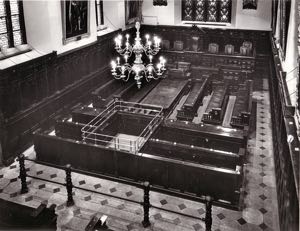
Last man to be sentenced to hang at the Guildhall - 1952
Page added 28th December 2014
Back to historic events in Exeter
On the afternoon of Thursday 30th October 1952, in the Guildhall, Judge Mr Justice Devlin sentenced 20 year old Brian Gordon Churchill to hang, for stabbing to death 17 year old Jean Agnes Burnett. This was the last time that the death sentence was passed in the Guildhall.
Churchill, who was originally from Cheltenham, lived at 1 Topsham Road. He worked for Leonards shoe shop in the High Street from late 1951 to March 1952 when he left, stating that he found difficulty working with the female staff. Jean Agnes Burnett was also an employee at Leonards, and it was during this time that Churchill became attracted to the young shop assistant, even though she had not encouraged him. On 22nd July, Miss Burnett, who lived at 76 Wykes Road, caught the route 'A' double decker to work as normal. When she left her seat on the top deck to alight at her destination in the High Street, Churchill, who had followed her onto the bus, leapt up and plunged a twelve inch, curved 'Oriental' dagger into her stomach, penetrating her liver. Churchill then ran from the scene. Miss Burnett was taken to the Royal Devon and Exeter Hospital, but despite emergency surgery, she died that afternoon.
Churchill was quickly apprehended in the Topsham Road by the police, when he gave his name as Hancock, and was remanded for attempted murder. When told that Miss Burnett was still alive he stated that "She ought to be dead by now". When news of the girl's death reached the police, Churchill was charged with murder.
The Trial
At the trial, it
was revealed that Churchill had been accompanied by his solicitor and
three warders to a wood near Digby Hospital where he uncovered a sodden
diary from under a pile of leaves. Extracts of the diary were read out
in court –
March 10th "J Burnett must die before I do because I
was too old for her. She only laughed at me and thought me soft. I
thought a lot of her once, and would have done anything for her. If I
cannot have her nobody else will. One day we shall be together always."
March
31st "I pray to God we could die
together.
June 18th "Saw
J. B. waiting for bus. I felt more for her than ever before."
July
18th, the last entry "Most likely the
last time I will enter in this diary the way I feel to kill."
Churchill's defence was that he was insane at the time of the murder. Witnesses were called to prove this assertion. His Probation Officer said that Churchill had been under his supervision after he had been rescued with three other boys in mid-Channel, after taking a boat. He had become very bitter after losing his job at Leonards and the probation officer "advised him to see a doctor as he appeared to be heading for a nervous breakdown." The defence also examined witnesses who described Churchill's upbringing as 'terrible'. The jury was asked to consider that although he was at present a sane man, "... he was insane at the time of the stabbing."
The jury deliberated for 40 minutes before returning, for the foreman to announce a unanimous verdict of guilty of the wilful murder of Jean Agnes Burnett. The sentence of death was given by Justice Devlin, only a few yards from where the girl had been stabbed on the bus.
On 17th November 1952 it was announced that the Home Secretary recommended a reprieve for Brian Gordon Churchill, the last man to be sentenced to death in Exeter's Guildhall.
Sources - The Times (17 Nov 1952) and the Express and Echo (22 July and 30 October 1952) - thanks to Peter Hinchliffe for pointing this story out.
 The Guildhall when it was a court. The accused would have stood in the enclosed dock, while the judge
sat on the grand chair at the rear of the photo. Photo courtesy of Tony Lethbridge.
The Guildhall when it was a court. The accused would have stood in the enclosed dock, while the judge
sat on the grand chair at the rear of the photo. Photo courtesy of Tony Lethbridge. Preserved Exeter Corporation 17, HFJ144, an all-Leyland PD2/1, new in 1947. It was on the top deck of this bus that the murder took place. © Ian Banks
Preserved Exeter Corporation 17, HFJ144, an all-Leyland PD2/1, new in 1947. It was on the top deck of this bus that the murder took place. © Ian Banks
│ Top of Page │